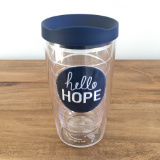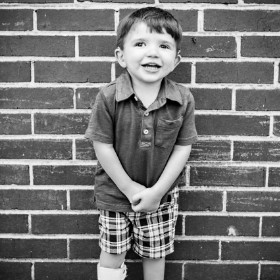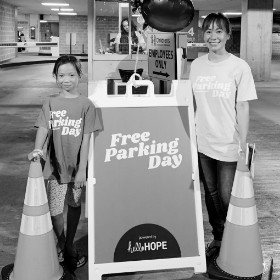You Can Be Sad and Still Have Hope
Are you familiar with the story of Pollyanna? It’s a book turned movie produced in 1960 in which an orphaned girl moves to a new community where she spreads her cheeriness like wildfire. She does this by playing what she calls “the glad game.” Many people who come in contact with her are at first repelled by her naive optimism; however, by the end of the story, Pollyanna wins the community over to the glad game, all trading their gloominess for gladness.
Pollyana is undeniably a sweet, encouraging movie. Nonetheless, those familiar with the term “Pollyanna” know that it holds negative connotations. A Pollyanna is a person who perpetually plays the glad game and perhaps never stares hard things in the eye. Pollyannas tend to make hurting people hurt a little more sometimes.
I know this because I’ve experienced it as a mother with a child with special needs. People have played the glad game with me when I needed a shoulder to cry on. Proverbs 25:20 says, “Whoever sings songs to a heavy heart is like one who takes off a garment on a cold day, and like vinegar on soda.” Heavy hearts do not need to play the glad game. Heavy hearts need to lament.
It is not unusual that parents might feel heavy as they navigate having a child with a medical diagnosis. We want to be hopeful, but perhaps we aren’t there yet. Maybe we are still grieving. Maybe we are just plain sad.
Learning to Lament in Sadness
Over the past few years, the Lord has been teaching me how to lament.
Lament is just a fancy term for turning to God with our complaints. Psalm 62 has been an anchor for my heart when I am bubbling to the brim with emotion and grief:
“Trust in him at all times, O people; pour out your heart before him;
God is a refuge for us. Selah”
Psalm 62:8
When I am overcome, I can pour it all out before the Overcomer.
Through my study of the subject of lament, I got my hands on a new book called Dark Clouds, Deep Mercy by Mark Vroegop. Toward the beginning of the book, he speaks frankly about a time that he encouraged his congregation to write a personal lament using the Bible as a framework. He suggests beginning with a short one like Psalm 13:
How long, O LORD? Will you forget me forever?
How long will you hide your face from me?
How long must I take counsel in my soul
and have sorrow in my heart all the day?
How long shall my enemy be exalted over me?
Consider and answer me, O LORD my God;
light up my eyes, lest I sleep the sleep of death,
lest my enemy say, “I have prevailed over him,”
lest my foes rejoice because I am shaken.
But I have trusted in your steadfast love;
my heart shall rejoice in your salvation.
I will sing to the LORD,
because he has dealt bountifully with me.
In this Psalm you hear the psalmist cry out to the Lord feeling utterly forsaken. He feels that God is far off and is experiencing deep sorrow. He fully expresses his complaint before the Lord, but does not leave it there. He then affirms his trust in God, the hope of his heart.
Here’s the great news for heavy hearts: You can be sad and still have hope!
Lament is a bridge from grief to hope. Vroegop captures this idea when he says that laments are not “cul de sacs of sorrow but bridges that lead us to God’s character.” Lament gives us the language we need to move forward. It guards us from despair and pushes us to hope in God regardless of our circumstances.
Practicing Lament and Finding Hope
When we practice lamenting, we are ultimately worshipping God. Here is an example of a personal lament using Psalm 13:
How long will this pandemic rage on?
How long will I feel isolated from the world around me?
What are you doing, God?
How long will I experience daily grief as I watch the world in crisis?
How long will my son go without therapy?
How long will he be unable to swallow water? Unable to speak to me?
Consider me and answer me, Lord!
I am weary.
Come to my rescue before I crumble,
And those who disbelieve you mock me.
But I have trusted in your steadfast love;
My heart shall rejoice in your salvation.
I will sing to the Lord because he has dealt bountifully with me.
I am going to assume that a few people reading my lament felt uncomfortable with it, especially the first portion. Bear with me. Now more than ever, I believe the church must grow more comfortable with the language of lament. It is good for us to cry out to the Lord in our grief, for He is the only One who has the power to heal the brokenhearted.
Our Ultimate Example of Lament and Hope
The Bible affirms that the language of lament is needed. Look at Lamentations— an entire book dedicated to seeing hard things and speaking to the Lord about them. Prophets like Jeremiah, Micah, and Habakkuk wail and weep when they see that sin and injustice prevails.
Jesus, the Savior of our soul, the Perfect One, lamented in the face of death:
“In the days of his flesh, Jesus offered up prayers and supplications, with loud cries and tears, to him who was able to save him from death, and he was heard because of his reverence”
Hebrews 5:7
Let me suggest to you during this Easter season that it is important to stop and grieve Christ’s death. We do not grieve without hope, but we grieve that it had to happen. We grieve that our sin held Jesus there on that cross. We grieve that he was mistreated, mocked, and stripped of dignity. We grieve that for three days, Jesus’ body lay cold and bruised.
If we do not pause to grieve the worst thing that ever happened in history, our hearts will not swell as we hear “Christ the Lord is risen today, Alleluia!”
Dear friends, it is my prayer that we would grow more comfortable with the language of lament. As we experience the heaviness of a child’s diagnosis or the circumstances of our world today, let us grieve in a way that leads to hope. Let us use the Bible as our guide.

About the Author
Mary Brantley Meade lives in Atlanta, Georgia with her husband and three young children. Her background is early childhood education, and she most recently received a masters in counseling from Westminster Theological Seminary. When she’s not counseling or writing, you can find her enjoying the outdoors with her family.













